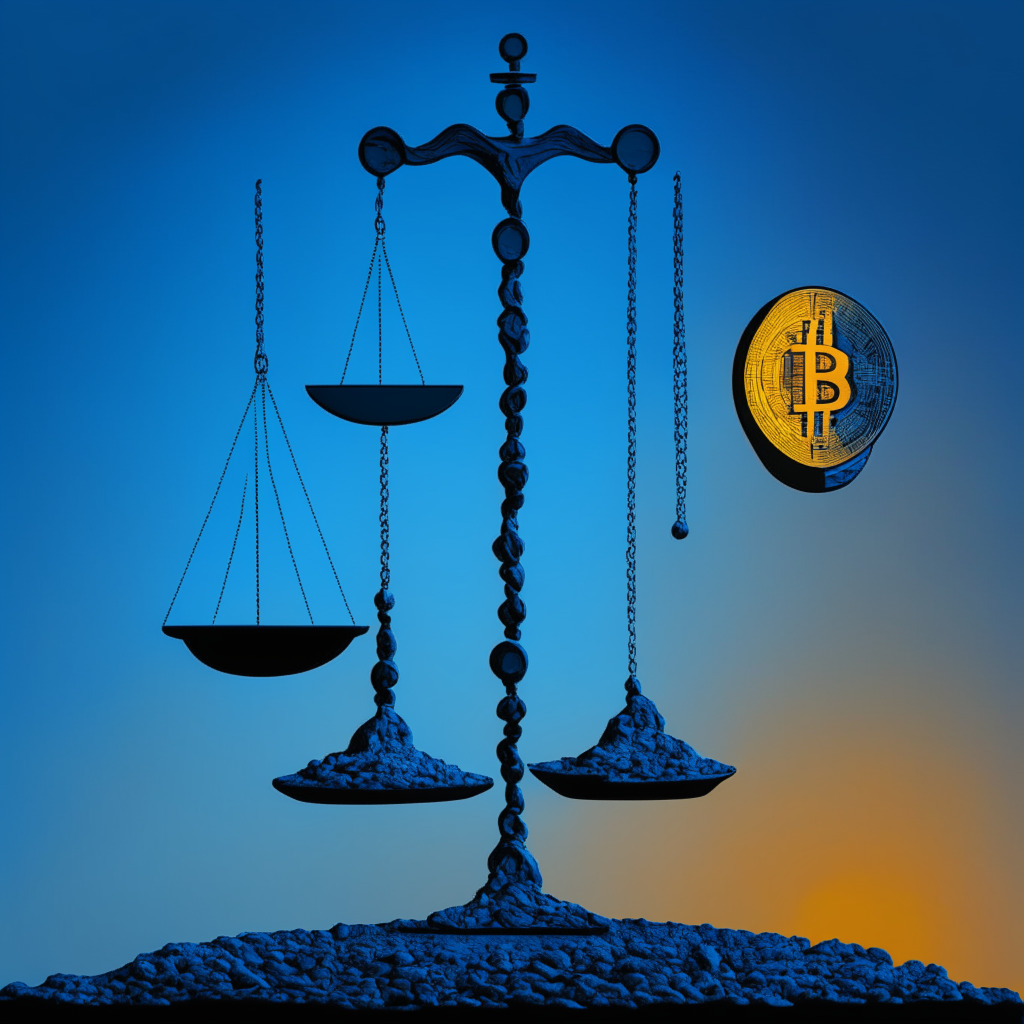Binance, a leading cryptocurrency exchange, has applied for registration in Taiwan under the jurisdiction’s Money Laundering Control Act and Financial Supervisory Commission compliance. This aligns with Taiwan’s efforts to implement Anti-Money Laundering laws for virtual asset service providers amidst a developing regulatory environment.
Search Results for: RSI
AI-powered Cryptocurrency Scams: A Double-Edged Sword in the Age of Digital Currency
A year-long study by San Diego State University yielded an AI algorithm, GiveawayScamHunter, to combat rising cryptocurrency scams. The technology revealed over 95,000 scams, leading to losses exceeding $872,000 in a year. The research further disclosed scam-associated domains and wallets, stressing the importance of transparency and vigilance in the evolving cryptocurrency landscape.
Rise of Meme Coins Amidst SEC’s ETF Delay – Is Altcoin Season Approaching?
“Shiba Inu and Pepe have seen an 8% rise in 24 hours, potentially linked to Ark Bitcoin ETF delay by SEC. Analysts suggest altcoins could rocket ahead of Bitcoin’s next ‘halving’ in 2024. Meanwhile, new meme coins, $SHIB and $PEPE, show promise but investors are urged to conduct due diligence; crypto carries high risk.”
Navigating the Vibrant Landscape of Web3: Innovation, Controversy and the Role of AI
“Y00ts, an NFT collection migrated from Polygon’s blockchain to Ethereum, stirring controversy. Coinbase’s new Base blockchain, though encouraging, requires vigilant monitoring. Aptos, a Layer 1 blockchain, teamed with Microsoft for AI integration, urging investments to be made with discernment.”
Fundsz Busted: Cryptocurrency Fraudsters and the Need for Vigilant Regulation
“The exchange Fundsz and associated individuals were recently accused by the CFTC of fraudulent cryptocurrency trading, misleading over 14,000 individuals with exaggerated return projections. The CFTC alleged Fundsz’s entire business model was built upon fabricated profits, never actually trading with customer funds.”
Navigating Blockchain: Innovations, Challenges, and the Intriguing Future of Cryptocurrency
“A telling report by Glassnode indicates that long-term crypto holders are showing tenacity, with Coinbase and Binance creating waves in the sector. Coinbase launched its Ethereum layer-2 blockchain, whereas Binance became the first fully licensed crypto exchange in El Salvador.”
Lil Tay: Caught in the Crossfire between Social Media Stardom and Crypto Currencies
Internet influencer Lil Tay’s rise to fame coincides with the unauthorized launch of a cryptocurrency bearing her name. Amid rumors surrounding her disappearance, her manager Harry Tsang introduces an Ethereum-based “Liltay Token.” The situation underscores the trend of tokens inspired by real-world events and celebrities, and the risk of counterfeit versions and scams in the crypto marketplace.
Securing the Cryptosphere: Crypto-Heists & How to Mitigate Future Threats
“The recent $62 million hack of Curve Finance highlights a pressing need for improved security in the cryptocurrency landscape. The considerable financial damage reveals potential vulnerabilities in DeFi platforms. Despite nearly 79% of funds successfully recovered, this unfortunate incident brings attention to the preparedness of DeFi sector against sophisticated threats.”
South Korean Crypto Scam Spurs Debate on Legal Repercussions for Fraudulent Activities
“A significant crypto scam in South Korea swindled approximately $651 million from nearly 8,000 people, highlighting the need for stringent regulatory measures. The scam promised enticing payouts through a cryptocurrency platform, leading to financial turmoil for investors. The incident underscores the potential dangers within the crypto arena and amplifies the call for robust legal framework surrounding cryptocurrencies.”
Navigating the Regulatory Maze: Kyle Davies, PayPal and the Evolving Crypto Landscape
“Co-founder of Three Arrows Capital, Kyle Davies, avoided contempt charges in US Bankruptcy Court due to Singaporean citizenship. This development could impact the recovery efforts of liquidators seeking $1.3 billion from Davies. Meanwhile, PayPal’s new stablecoin PYUSD faces potential regulatory challenges, signaling a pivotal role of regulation in the future of cryptocurrencies.”
Regulation Vs. Innovation: The Tug of War Impacting Crypto Markets
“The SEC’s recent decision to postpone and seek public opinion on Ark Invest’s Bitcoin ETF application reveals the uncertainties that potential regulatory implications pose to the crypto universe. Crypto assets such as Fantom, Shibie, Rocket Pool, Chimpanzee, and Sui have attracted attention, displaying the ongoing tug between bullish optimism and regulatory caution.”
Unveiling PayPal’s Stablecoin: Impact on Ethereum, Crypto Centralization & The Rise of Chatbot Trading
“PayPal has launched its stablecoin PayPal USD (PYUSD), stirring a debate on potential implications and risks. As PayPal explores the stablecoin space, Bitstamp seeks global expansion, and Coinbase launched its Base layer-2 network. Meanwhile, Telegram bot crypto trading popularity is on the rise.”
AI-Powered Scam Hunting: The Battle Against Crypto Giveaway Frauds on Social Platforms
San Diego State University researchers have leveraged artificial intelligence to identify over 95,000 cryptocurrency scam cases on social networking platforms. This AI system, termed GiveawayScamHunter, aids in recognizing scams by sifting through user data associated with identified prize scams, enhancing understanding of scammers’ techniques and stressing on user safety and caution.
FTX Founder Sam Bankman-Fried’s Legal Duel: Ethics, Law, and the Crypto Future
“FTX founder Sam Bankman-Fried faces serious charges including securities fraud, wire fraud, and money laundering. Allegations of bond violation and witness tampering are under scrutiny. His troublesome situation serves as a stark reminder of the importance of upholding rules and integrity in the ever-evolving crypto industry.”
Breaking Boundaries with Zero Knowledge Proofs: Andreessen Horowitz’s Lasso and Jolt Projects Unveiled
Andreessen Horowitz recently unveiled two innovative open-source projects, Lasso and Jolt, centered around zero-knowledge proofs – a robust form of cryptography. These initiatives aim to enhance transaction speed, cut costs, boost privacy, and empower external developers, introducing new opportunities to scale blockchain networks.
Rumblings in the Crypto World: A Closer Look at the Gemini-DCG Legal Battle and its Potential Impact on Blockchain Future
“The Gemini-DCG feud underscores the delicate line between corporate responsibility and independent operational functions in crypto conglomerate subsidiaries. It poses critical questions about corporate accountability in the crypto ecosystem. All eyes are on the court, as the outcome of this case has the potential to set a precedent in shaping future blockchain-based market practices.”
Visa Maneuvers into Ethereum’s Ecosystem: Streamlining Transactions or Threatening Decentralization?
Visa has tested a method for paying on-chain gas expenses with traditional currency through card transactions, aimed at simplifying blockchain technology. Their solution uses Ethereum’s ERC-4337 standard, allowing smart contracts to cover gas fees, potentially making blockchain interactions more accessible for everyday users. However, concerns are raised about maintaining blockchain’s decentralized ethos.
Unraveling the Web of Deception Surrounding Crypto Mogul Bankman-Fried’s Legal Battle
“Sam Bankman-Fried, a renowned cryptocurrency figure, faces allegations of manipulating evidence and intimidating witnesses in a fraud case. Prosecutors suggest his untruthful narratives, attempts at tampering with witnesses, and use of VPN software to hide digital footprints could be misleading potential jurors and distorting the real story.”
Investigation on Worldcoin’s Data Privacy – A Closer Look into the Argentinean Scrutiny
Argentina’s Agency for Access to Public Information is investigating Worldcoin’s data privacy methods. The project, backed by OpenAI originator Sam Altman, bestows a digital ID on users through eye-scanning orbs which has raised concerns over infringement of rights.
Iris-Scanning Tech Meets Crypto: The Worldcoin Experiment, Innovation or Just Overreach?
Worldcoin, a crypto initiative utilizing iris-scanning for human identification, recently introduced a reservation feature for unverified users to secure their Worldcoin (WLD) tokens. Despite regulatory hurdles and data privacy concerns, this marks a significant step in expanding its user base.
Reshaping Prime Trust: The Harsh Backlash or a Brighter Path to Crypto Custody Future?
Crypto custodial service, Prime Trust, faces potential layoffs estimated at 75% of its workforce amid financial and regulatory hurdles. The company recently fell into receivership, following customer fund deficits and failed acquisition by BitGo. Critics suggest this signifies an unstable future, while others view it as restructuring for a leaner operation.
Navigating Innovation and Regulation in Crypto – A Global Odyssey
“The Argentine Agency for Access to Public Information is investigating Worldcoin’s data collection practices; Canadian authorities aim to improve storage of seized digital assets including NFTs; Coinrule recently launched its Marketplace driven by Generative Models. This crypto evolution requires a balance between innovation and regulation.”
The SEC’s Prolonged Review of Bitcoin ETFs: A Balanced Approach to Blockchain’s Future or Fear of Risks?
“The U.S. Securities and Exchange Commission prolongs review of the Ark 21Shares bitcoin ETF application, citing concerns of market manipulation and inadequate consumer protection. Despite this, Ark Investment Management remains optimistic about receiving approval. However, warnings of potential market vulnerabilities and investor risks persist.”
Blockchain Technology: Revolutionary Rewards or Troublesome Trade-offs?
“Blockchain technology has made significant strides, providing security, transparency, and fast transactions while also facing challenges like energy consumption, security loopholes, and regulatory issues. Its potential and drawbacks set the pace for its widespread reception, urging us to tread with caution.”
Navigating the Roadblocks for Mainstream Cryptocurrency Adoption: An In-depth Analysis
“Cryptocurrency’s trajectory to mainstream adoption is hindered by significant challenges such as education gaps, regulatory issues, blockchain interoperability, infrastructure needs, and security concerns. Notwithstanding these, ongoing collaboration between developers, businesses, institutions, and governments fosters cautious optimism about crypto’s mainstream integration.”
NFTs and Art Collecting: Challenging the Conventional Paradigm with Mystery Artists
“Art collecting sees a shift with NFTs disrupting conventional paradigms and putting emphasis solely on art, not artists. Through blockchain technology, tokenized art is promoting unique speculative tendencies among collectors. Companies like Amazon Prime are also marking their entry into the NFT realm.”
Navigating the Globe: The Paradoxical State of Blockchain Adoption and its Compliance Roadmap
“Blockchain technology’s global adoption faces challenges including national policies, cultural differences, and traditional banking systems. While some countries embrace it as a legal tender, others ban its adoption, leading to unregulated P2P markets. The path to universal adoption calls for balance between regulation and innovation. Increasing adoption will force institutions to facilitate access or risk obsolescence.”
Striking the Golden Balance: Centralization vs Decentralization in Ethereum’s Liquid Staking Landscape
“Ethereum is on the verge of transformative change thanks to liquid staking. While centralized liquid staking protocols currently dominate, they pose systemic risks. Decentralized protocols exist, but face scalability issues and have a small portion of ETH staked. The challenge is to strike a balance between scalability and decentralization, potentially by reducing the minimum capital requirement to run a validator node.”
Navigating Crypto’s Role in Political Fundraising: A New Dawn or Regulatory Nightmare?
The California Fair Political Practices Commission issued new rules for political aspirants accepting crypto donations, outlining specific procedures to ensure transparency and accountability. Crypto donations are becoming common in campaigns, though with stipulations around anonymous donors and exchange agreements. Regulations also cover advertising disclosures, contribution limits, and more.
Unleashing the Future of Cryptocurrency with Visa’s Ingenious Off-Chain Gas Fee Solution
Visa has initiated tests to enable cryptocurrency users to pay on-chain gas fees directly through Visa card payments. This innovative project aims to circumvent the traditional requirement for users to maintain their Ethereum balances to cover fluctuating gas fees. The process involves a “paymaster” smart contract for off-chain gas fee settlements, which could significantly simplify cryptocurrency transactions and enhance user experiences.
Worldcoin’s Audacious Move: Biometric Drawbacks Meet Visa’s On-chain Innovation
The Worldcoin project, offering Worldcoin tokens in return for scanning users’ irises to create a biometric ID system, faces skepticism and regulatory challenges globally. Despite announcing overloading of 2 Million customers before launch, the actual usage remains unclear.
Crypto Showdown: Hedera Hashgraph’s Downturn Vs. XRP20’s Astounding Rise
Hedera Hashgraph (HBAR) is currently grappling with a serious downward trend, demonstrating a -11.3% retracement since Wednesday. Meanwhile, XRP20, an Ethereum-compliant ERC20 token, has sparked interest by raising over $1.79 million, promising unique tokenomics and a deflationary mechanism for holders.































